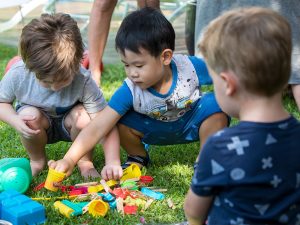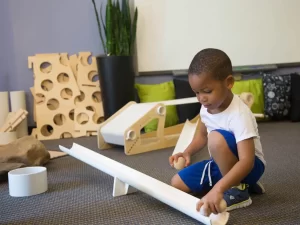As parents, teachers, and caregivers, we all want what’s best for the children in our lives. We want them to grow up healthy, happy, and equipped with the skills they need to succeed in the world. But with so many different approaches to child-rearing out there, it can be hard to know where to focus our attention.
The answer, it turns out, may be simpler than we think: play. Yes, you read that right. Something as simple as playing with toys, running around outside, or building a fort can actually have a profound impact on a child’s growth and development.
So why is play so important? For starters, it helps children learn. When kids play, they’re not just mindlessly passing the time; they’re actively exploring, experimenting, and problem-solving. They’re learning about cause and effect, spatial relationships, and social dynamics. And they’re doing it all in a way that’s fun, engaging, and meaningful to them.
But that’s not all. Play also promotes creativity, imagination, and self-expression. It helps children develop a sense of curiosity and wonder about the world around them. And it gives them an outlet to express their thoughts, feelings, and ideas in a safe and supportive environment.
Perhaps most importantly, play helps children build social skills and emotional intelligence. When kids play together, they learn how to take turns, share, and communicate effectively. They learn how to empathize with others, negotiate conflicts, and form friendships. And they do it all while having fun and building positive memories that will last a lifetime.
So the next time you’re tempted to skip playtime in favor of more “productive” activities, remember the power of play. Your child’s growth, development, and happiness may depend on it.
Discover the incredible benefits of play for child development in our latest article. From promoting learning and creativity to building social skills and emotional intelligence, play is an essential tool for parents, teachers, and caregivers.
Explore why playtime is crucial for child growth, and how it helps kids develop vital skills in a fun and engaging way. With expert insights and practical tips, this article will equip you with the knowledge you need to make play a priority in your child’s life. Don’t miss out on this essential guide to unlocking the power of play.
How does play promote child development?

Play is an essential tool for child development as it provides a multitude of benefits. One of the primary ways play promotes child development is by helping children learn. Play allows children to explore, experiment, and problem-solve in a way that is meaningful and engaging to them. It helps them develop cognitive, physical, and social-emotional skills that are necessary for their growth and development.
For example, playing with blocks or puzzles can help children develop spatial reasoning skills and hand-eye coordination. Playing dress-up or engaging in imaginative play can help children develop their creativity and imagination. Cooperative play with peers helps children develop social skills such as communication, collaboration, and negotiation. These skills are all crucial for success in school, relationships, and life in general.
Furthermore, play also helps children develop emotional regulation and self-expression skills. By engaging in play, children learn how to express themselves, their emotions, and their thoughts in a safe and supportive environment. This promotes emotional intelligence, which is essential for success in relationships, school, and life.
What types of play are most beneficial for child development?

All types of play are beneficial for child development, but some types of play have more significant benefits than others. For example, imaginative play or pretend play is one of the most beneficial types of play for children. It allows children to use their imagination, creativity, and problem-solving skills to create scenarios and stories. This type of play helps children develop their cognitive, social-emotional, and language skills.
Another beneficial type of play is cooperative play, which involves playing with others. Cooperative play helps children develop social skills such as communication, teamwork, and conflict resolution. Children learn how to share, take turns, and work together to achieve a common goal.
Outdoor play is another crucial type of play that promotes child development. It allows children to explore their surroundings, connect with nature, and engage in physical activity, promoting physical health and overall well-being.
How can parents and caregivers encourage play for child development?
Parents and caregivers can encourage play by providing children with a safe and supportive environment. This includes providing age-appropriate toys and games that promote exploration, imagination, and creativity. Setting aside dedicated playtime is also important, as it allows children to engage in play without distractions or interruptions.
Joining in on the fun and playing with children can also encourage play for child development. This helps to strengthen the bond between the child and caregiver, promoting positive emotional development.
Encouraging children to engage in different types of play is also important for promoting a well-rounded approach to playtime. This includes imaginative play, creative play, outdoor play, and cooperative play.
In conclusion, play is an essential tool for child development, promoting cognitive, physical, social-emotional, and language skills. Parents and caregivers can encourage play by providing a supportive environment, age-appropriate toys and games, and dedicated playtime. Engaging in play with children and promoting different types of play can also support overall child development.
How much playtime is necessary for child development?
The American Academy of Pediatrics recommends that children engage in at least 60 minutes of physical activity per day, and that a significant portion of this time should be dedicated to play. For younger children, the majority of playtime should be unstructured, while older children may benefit from structured play such as team sports or music lessons. Ultimately, the amount of playtime necessary for child development may vary depending on the child’s age, interests, and needs.
What are the consequences of not allowing playtime for child development?
Not allowing enough playtime can have negative consequences on child development. Children who do not engage in playtime may experience developmental delays, have difficulty socializing with peers, struggle with self-expression and creativity, and experience difficulty regulating their emotions. Additionally, children who do not have access to playtime may be at an increased risk of obesity, depression, anxiety, and other mental health issues.
How can play be incorporated into education to promote child development?

Play-based learning can be an effective way to incorporate play into education and promote child development. Play-based learning involves structured play activities that are designed to teach specific skills and concepts. This approach can be particularly effective for young children, as it allows them to learn through exploration, experimentation, and play. Play-based learning can be incorporated into a variety of subjects, including math, science, and language arts.
Conclusion:
Play is an essential tool for child development, promoting cognitive, physical, social-emotional, and language skills. Children benefit from different types of play, including imaginative play, cooperative play, and outdoor play. Parents and caregivers can encourage play by providing a supportive environment, age-appropriate toys and games, and dedicated playtime. Educators can also incorporate play-based learning into their curriculums to promote child development. By prioritizing play, we can help children develop the skills they need to thrive and succeed in school and in life.

